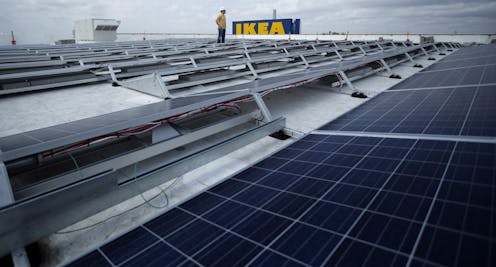Why companies as diverse as eBay, IKEA and Mars are increasingly supporting US clean energy policies
Increased business lobbying for incentives and mandates may tip the balance in favor of a cleaner US energy policy.

The Research Brief is a short take about interesting academic work.
The big idea
My new analysis of companies that seek to buy renewable electricity finds that business is becoming a powerful new ally in the U.S. political battle to stop climate change. Driven by pressure from environmental groups and by the increasingly competitive prices of wind and solar, many companies have pledged to power their operations with clean energy. But the legal and technical complexity of U.S. electricity markets has stalled corporate progress on their clean power goals. This has prompted companies as diverse as eBay, Mars, IKEA and Walmart to push for public policies that expand the generation of renewable energy in the U.S. and make it more accessible through mandates, incentives and other regulations.
Why it matters
Politically powerful fossil fuel interests have long steered U.S. policy toward carbon-intensive energy and economy. Increased business lobbying for clean energy policies by the likes of Nestle, Salesforce, Unilever and other large companies has the potential to tip the political scale in favor of a carbon-free economy and help the U.S. reach or exceed Paris Agreement emissions targets.
What still isn’t known
It is still unclear if clean energy efforts by corporate energy buyers will be enough to outweigh the massive political influence of the fossil fuel industry in time to avert the worst effects of climate change. There’s little evidence of a slowdown in lobbying by fossil fuel interests, so the question is whether corporate lobbying for clean energy will ramp up fast enough to change the course of U.S. climate and energy policy.
What’s next
For my next project, I plan to compile a database of companies and industries that are struggling to meet pledges for greening various corporate operations and supply chains. Using this database, I aim to identify cases in which stronger public environmental policies can help businesses meet a range of environmental commitments. I further aim to identify ways to mobilize business advocacy in favor of stronger environmental policies.
[Deep knowledge, daily. Sign up for The Conversation’s newsletter.]
Zdravka Tzankova has previously received funding from the National Science Foundation, SESYNC (The National Socio-Environmental Synthesis Center) and the Kearney Foundation. The researched briefed in this piece is not funded by any external sources.
Read These Next
Iran-US nuclear talks may fail due to both nations’ red lines – but that doesn’t make them futile
The US administration may sense that Iran is weak and ready to do a deal. But negotiations could be…
In World War II’s dog-eat-dog struggle for resources, a Greenland mine launched a new world order
Strategic resources have been central to the American-led global system for decades, as a historian…
Revisiting the story of Clementine Barnabet, a Black woman blamed for serial murders in the Jim Crow
In 1912, a young Black woman’s supposed religious beliefs were quickly blamed to make sense of a terrifying…





